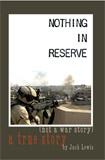Last fall, I was privileged to teach a writing seminar to wounded warriors of Task Force Phoenix at Fort Lewis, Washington. Part of the classroom curriculum was a two-minute writing exercise requiring use of an image to convey a feeling. No particular venue, theme or genre was prescribed; nevertheless, all but one participant wrote a military-themed vignette, most about combat or its fallout. Maybe that was the point.
In the army, one difference between officers and non-commissioned officers is that NCOs are expected to be to able to promptly, proficiently and personally demonstrate anything they ask of their troops. Because I had been a sergeant, I wrote my assignment alongside my students.
The following, unedited, is what fell out onto the page.
————————————————–
He was the first one to teach me “shu’kran,” though it wasn’t his native language, either. I don’t remember his name now; I don’t remember most names now, not of places or people or battles or schools. It was a long flow and the river ran fast, but he stood out like a rock in the stream, a grinning laughing shouting Kurdish stone with Arabs flowing past or breaking against him as they, or he, or fate would choose. We called him Carlos. Carlos liked that.
Carlos joked and wrassled and grab-assed with Americans, unless they were female. He gave our female soldiers a wide berth and careful deference, as thought they were of a different order, and could melt away his stone surface that no cold flow of local men could wear down.
We weren’t afraid when they shot Carlos. Running over, we expected to find only scratches, chips in the rock. But even diamonds shatter if you hit them just right, above the collar of their IBA, just underneath the chin.
A breakable thing with his laughter drained away wasn’t Carlos anymore. Female soldiers bore him away. There was no embarrassment.

 "Jack Lewis takes the overall literary crown with his new book...there’s a lot more to Lewis’s work than what it feels like to ride motorcycles.” — Ultimate Motorcycling
"Jack Lewis takes the overall literary crown with his new book...there’s a lot more to Lewis’s work than what it feels like to ride motorcycles.” — Ultimate Motorcycling
 "Insightful and from the heart ... a driven and much recommended look into the mind and conflict of the next generation of war veterans. " — Midwest Book Review (Reviewer's Choice)
"Insightful and from the heart ... a driven and much recommended look into the mind and conflict of the next generation of war veterans. " — Midwest Book Review (Reviewer's Choice)
Wow! ::deep breath::
You do paint a blindingly brilliant word picture, young man. Right and proper.